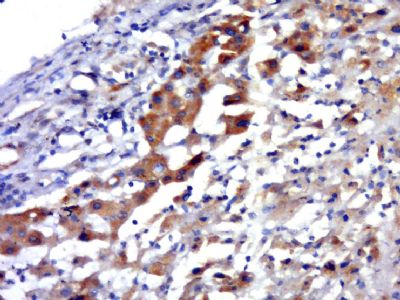Anti-MIP3/CCL23抗体
产品名称: Anti-MIP3/CCL23抗体
英文名称: MIP3/CCL23
产品编号: YB--2482R
产品价格: null
产品产地: 中国/美国
品牌商标: Ybscience
更新时间: 2023-08-17T10:29:50
使用范围: 科研使用
上海钰博生物科技有限公司
- 联系人 : 陈环环
- 地址 : 上海市沪闵路6088号龙之梦大厦8楼806室
- 邮编 : 200612
- 所在区域 : 上海
- 电话 : 183****2235
- 传真 : 021-60514606
- 邮箱 : shybio@126.com
Anti-MIP3/CCL23抗体
| 产品编号 | YB-2482R |
| 英文名称 | MIP3/CCL23 |
| 中文名称 | 巨噬细胞炎性蛋白抗体 |
| 别 名 | MIP3; MIP 3; MIP-3; C-C motif chemokine 23; Macrophage Inflammatory Protein 3; hMIP-3; C6 beta chemokine; CCL 23; CCL23; Chemokine (C C motif) ligand 23; Chemokine CC motif ligand 23; ck beta 8; CKB 8 ; Ckb-8-1; CKB8; CKbeta8; Hmrp-2a; hmrp2a; macrophage inflammatory protein 3; MIP 3; MIP3; MPIF 1; MPIF1; Myeloid progenitor inhibitory factor 1; OTTHUMP00000163948; SCYA 23; SCYA23; Small inducible cytokine A 23; Small inducible cytokine subfamily A (Cys Cys) member 23; Small inducible cytokine subfamily A (Cys-Cys), member 23; Small inducible cytokine subfamily A, member 23; chemokine. |
| 规格价格 | 100ul/1380元 购买 200ul/2200元 购买 大包装/询价 |
| 说 明 书 | 100ul 200ul |
| 研究领域 | 免疫学 转录调节因子 |
| 抗体来源 | Rabbit |
| 克隆类型 | Polyclonal |
| 交叉反应 | Human, Pig, Cow, Horse, Guinea Pig, |
| 产品应用 | ELISA=1:500-1000 IHC-P=1:400-800 IHC-F=1:400-800 IF=1:100-500 (石蜡切片需做抗原修复) not yet tested in other applications. optimal dilutions/concentrations should be determined by the end user. |
| 分 子 量 | 11kDa |
| 细胞定位 | 分泌型蛋白 |
| 性 状 | Lyophilized or Liquid |
| 浓 度 | 1mg/ml |
| 免 疫 原 | KLH conjugated synthetic peptide derived from human CCL23:22-120/120 |
| 亚 型 | IgG |
| 纯化方法 | affinity purified by Protein A |
| 储 存 液 | 0.01M TBS(pH7.4) with 1% BSA, 0.03% Proclin300 and 50% Glycerol. |
| 保存条件 | Store at -20 °C for one year. Avoid repeated freeze/thaw cycles. The lyophilized antibody is stable at room temperature for at least one month and for greater than a year when kept at -20°C. When reconstituted in sterile pH 7.4 0.01M PBS or diluent of antibody the antibody is stable for at least two weeks at 2-4 °C. |
| PubMed | PubMed |
| 产品介绍 | background: This gene is one of several chemokine genes clustered on the q-arm of chromosome 17. Chemokines form a superfamily of secreted proteins involved in immunoregulatory and inflammatory processes. The superfamily is divided into four subfamilies based on the arrangement of the N-terminal cysteine residues of the mature peptide. This chemokine, a member of the CC subfamily, displays chemotactic activity on resting T lymphocytes and monocytes, lower activity on neutrophils and no activity on activated T lymphocytes. The protein is also a strong suppressor of colony formation by a multipotential hematopoietic progenitor cell line. In addition, the product of this gene is a potent agonist of the chemokine (C-C motif) receptor 1. Alternative splicing results in multiple transcript variants that encode different isoforms. [provided by RefSeq, Jul 2013] Function: Shows chemotactic activity for monocytes, resting T-lymphocytes, and neutrophils, but not for activated lymphocytes. Inhibits proliferation of myeloid progenitor cells in colony formation assays. This protein can bind heparin. Binds CCR1. CCL23(19-99), CCL23(22-99), CCL23(27-99), CCL23(30-99) are more potent chemoattractants than the small-inducible cytokine A23. Subcellular Location: Secreted. Tissue Specificity: High levels in adult lung, liver, skeletal muscle and pancreas. Moderate levels in fetal liver, adult bone marrow and placenta. The short form is the major species and the longer form was detected only in very low abundance. CCL23(19-99), CCL23(22-99), CCL23(27-99), CCL23(30-99) are found in high levels in synovial fluids from rheumatoid patients. Similarity: Belongs to the intercrine beta (chemokine CC) family. SWISS: P55773 Gene ID: 6368 Database links: Entrez Gene: 6368 Human Omim: 602494 Human SwissProt: P55773 Human Unigene: 169191 Human Important Note: This product as supplied is intended for research use only, not for use in human, therapeutic or diagnostic applications. |
| 产品图片 |
 Paraformaldehyde-fixed, paraffin embedded (liver cancer); Antigen retrieval by boiling in sodium citrate buffer (pH6.0) for 15min; Block endogenous peroxidase by 3% hydrogen peroxide for 20 minutes; Blocking buffer (normal goat serum) at 37°C for 30min; Antibody incubation with (CCL23) Polyclonal Antibody, Unconjugated (bs-2482R) at 1:500 overnight at 4°C, followed by a conjugated secondary (sp-0023) for 20 minutes and DAB staining.
|
